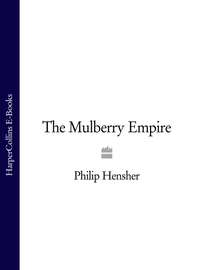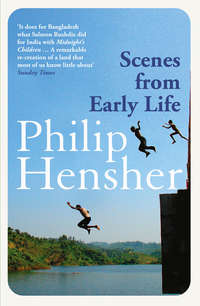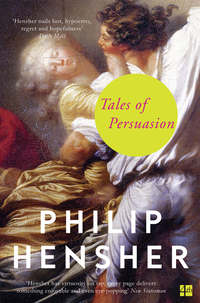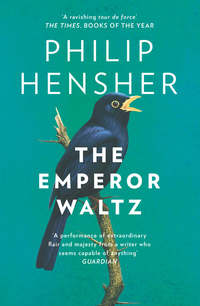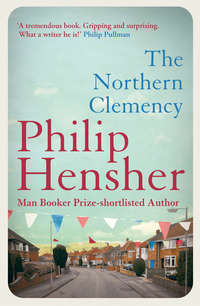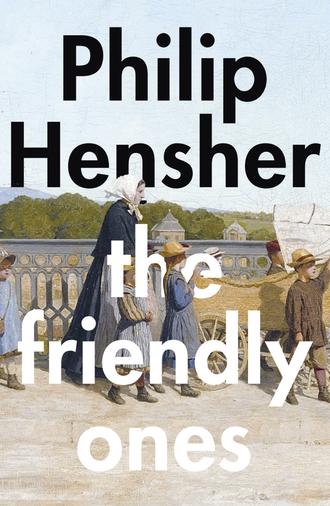
Полная версия
The Friendly Ones


Copyright
4th Estate
An imprint of HarperCollinsPublishers
1 London Bridge Street
London SE1 9GF
www.4thEstate.co.uk
This eBook first published in Great Britain by 4th Estate in 2018
Copyright © Philip Hensher 2018
Cover image by Albert Anker (1831–1910)
Kleinkinderschule auf der Kirchenfeldbrücke, 1900, oil on canvas
Gottfried Keller-Stiftung, Bundesamt für Kultur, Bern
Depositum im Kunstmuseum Bern
Extract from ‘Second’ taken from Happiness by Jack Underwood (Faber & Faber). Copyright © Jack Underwood, 2015. Reproduced by permission of Faber & Faber Ltd.
The right of Philip Hensher to be identified as the author of this work has been asserted by him in accordance with the Copyright, Designs and Patents Act 1988
A catalogue record for this book is available from the British Library
All rights reserved under International and Pan-American Copyright Conventions. By payment of the required fees, you have been granted the non-exclusive, non-transferable right to access and read the text of this e-book on-screen. No part of this text may be reproduced, transmitted, down-loaded, decompiled, reverse engineered, or stored in or introduced into any information storage and retrieval system, in any form or by any means, whether electronic or mechanical, now known or hereinafter invented, without the express written permission of HarperCollins.
Source ISBN: 9780008175641
Ebook edition: March 2018 ISBN: 9780008175665
Version: 2018-01-30
Dedication
For Zaved Mahmood, of course
Epigraph
If I lived in a cave and you were my only visitor,
what would I tell you that the walls had told me?
That people are unfinished and are made between
each other …
JACK UNDERWOOD, ‘Second’
… amid the millions of this great city it is difficult to discover who these people are or what their object can be …
ARTHUR CONAN DOYLE, The Hound of the Baskervilles
Contents
Cover
Title Page
Copyright
Dedication
Epigraph
BOOK ONE: THE LITTLE SPINSTERS
CHAPTER ONE
CHAPTER TWO
MUMMY’S TIME WITH LAVINIA
CHAPTER THREE
MUMMY’S TIME WITH LEO
CHAPTER FOUR
MUMMY’S TIME WITH BLOSSOM
CHAPTER FIVE
MUMMY’S TIME WITH HUGH
CHAPTER SIX
CHAPTER SEVEN
BOOK TWO: THE FRIENDLY ONES
CHAPTER EIGHT
CHAPTER NINE
CHAPTER TEN
CHAPTER ELEVEN
CHAPTER TWELVE
CHAPTER THIRTEEN
CHAPTER FOURTEEN
ACKNOWLEDGEMENTS
Also by Philip Hensher
About the Author
About the Publisher
BOOK ONE
CHAPTER ONE
1.
Towards the end of the afternoon, Aisha got up and stood at the garden window. The arrangements for the party had been in place since the morning – the hired barbecue, red and shiny under the elm tree, the festoons over the bushes, the torches lined up along the shrubbery. Over the fence, the old man was up a ladder against a fruit tree. He had been sweeping fallen white blossom from his lawn, and now had found something to do where he could see his neighbours better. Inside the room, the Italian was continuing to talk. Her mother and father were still listening.
‘Really?’ Nazia said inattentively. She could not see this one as a son-in-law. He was bald; his brown sweater hung, unravelling, around his dirty wrists. His party clothes were underneath. Aisha had been an eager, encouraging member of his audience until early yesterday evening, and then, quite abruptly, had wilted into silence and bored disinterest, passing him on to her parents, like a pet she had passionately wished for before finding the task of caring for it too much.
‘In Sicily, we often have such parties,’ the Italian was saying. ‘But it is too hot, in the summer, to have parties during the day where food is served. We wait until nine or ten o’clock in the evening, and then we eat cold food, perhaps some pasta. We would not grill meat like this, in the open air.’
‘Really?’ Sharif said, in his turn. A bird was singing in the elm tree, a loud, plangent, lovely note, as if asking a question of the garden. Underneath, the light fell through the leaves, dappling the lawn, the shiny red box of the barbecue, the white-shirted help, now talking quietly to each other, raising their eyes quizzically, serious as surgeons.
Nazia had felt she had done everything that she could have for Aisha’s Italian. They had taken him out to an Italian restaurant in Sheffield on Friday night, said to be very good, where he had poked suspiciously at his plate and explained about Sicilian food. They had gone out for the day into the countryside on Saturday, where Sharif had got lost and the stately home had failed to impress. She had cooked a real Bengali meal last night that Enrico couldn’t eat, and had said so. This morning, Aisha was supposed to take him for a walk in the neighbourhood, through the woods, but her change of heart yesterday had done for that. ‘Oh, Mummy,’ she had said, throwing her hands up, when Nazia had suggested it after breakfast. ‘Don’t be so dreadfully boring. I can’t think of anything worse. We’ll be perfectly happy just reading the paper.’
They had been in the square red-brick house almost four months. It was perfect, resembling a child’s first drawing of a house, with a square front, a door with brass knocker, windows to either side, and a chimney on both right and left. The purple front door had been changed to imperial blue, the kitchen modernized, the fitted carpets removed and the parquet flooring re-polished, the avocado bathroom altered to white: everything had been done under Nazia’s direction and control, but there had been no official opening.
Aisha had been mentioning her friend Enrico for some months now, another student on her MPhil course at Cambridge. Nazia and Sharif had agreed that they would be welcoming and open, however confiding or confrontational Aisha became in mentioning her friend. Aisha had said she would bring Enrico to visit them one weekend. It would be a perfect opportunity to have a lot of people round. They had agreed this without consulting Aisha. ‘Oh, Mummy, for God’s sake,’ Aisha had said, when she had heard. ‘Enrico doesn’t want to meet the aunties and hear about all their babies. I can’t imagine how you could inflict that on him.’ But this was an ordinary sort of complaint, not a storming-out, a door-slamming, a refusal to join in, and everyone knew how much fun a party could be. What they would have done with Enrico if they hadn’t been able to excuse themselves, to make sure the preparations were in order, Nazia could not imagine.
The Italian was leaning forward as if to make an important point, but he was still talking about the details of his country. ‘My mother and father always go away in August, to the same place in Tuscany they have gone to for forty years. A spa town. Many Sicilians go to the same spa town, and go at the same time. There would be no point in holding a party in the summer, in August, at home in Sicily.’ Italians were expected to be good-looking. But Enrico sat with his pale fat hands, like wet skinned fish, his black, chaotic hair about the bald dome. With his squashed, irregular and expository features, he looked like someone who should have been apologized for. Nazia knew that people could have different effects in different places. Enrico, in the damp cafés and libraries of fog-bound Cambridge, explaining about things to Aisha, showing her how the world was and how it could be put right: that was fascinating. For a moment she saw him, his face glowering with righteousness in a cloud of tea-steam, tearing at an English cake and bringing it in crumbs and fragments to his mouth, and Aisha opposite, listening. The Enrico in her head wore a scarf and a brown duffel coat and woollen gloves. He was not a person for home or family, but one to make a compelling case in public places and temporary rented rooms with another person’s ideas of wallpaper, a speechmaker with bold, urgent gestures. Aisha stood at the window, having renounced her Italian for the moment. There would be a slow, sour conversation on the train tomorrow.
‘Is that in Sicily, too?’ Sharif said politely.
‘In Sicily?’ Enrico said. There was a tone of mild astonishment in his voice, as if he had not been talking about Sicily, as if it were extraordinary and in slightly bad taste to have raised the subject at all.
‘The place you said – where your parents go on holiday.’
‘No, no, not at all,’ Enrico said. ‘I think I said it was in Tuscany.’
‘Really?’ Sharif said. He smiled, but fell silent. It was his way when he felt snubbed not to engage further, to let the other person do all the work from that point onwards. He could have explained that they had been on holiday to Umbria only two years before, where he had learned to say ‘Buon giorno’ and ‘Buona sera’. The Italian did not notice, and started to explain.
‘Who is that man next door?’ Aisha said suddenly, not turning round. ‘He’s been up that ladder for ages.’
‘We haven’t really met the neighbours,’ Nazia said to Enrico. ‘We’ve said hello – we apologized about the builders. Is he talking to the twins? He has an odd name – I can’t remember what it was, but it was really quite odd.’
‘They’re talking to him,’ Aisha said. ‘I think I’m going to go and fetch them in.’
‘Has Aisha shown you round the garden?’ Nazia said to Enrico. ‘We’re not gardeners at all. We’re having to get a gardener in to do all the work. He had to come twice last week. But it is nice. Are you interested in gardens, Enrico?’
But Enrico was not interested in gardens, and could only remember that in Sicily there was a lemon tree in his parents’ garden and some jasmine, which smelt too strong for him in the summer: it made him sneeze.
‘Oh, jasmine,’ Sharif said, calling himself back to the conversation, and remembering something himself. His tone was so fond and rich that Nazia looked at him expectantly. But he fell silent again. Nazia’s heart filled with love for her husband, lost in his association of ideas. Aisha left the room and, in a moment, was walking across the newly trim lawn towards her brothers, the twins, now talking across the fence with her parents’ neighbour. Nazia fervently hoped that she was going to get five minutes alone with her daughter before she left with the Italian the next morning.
2.
The house would do for the rest of their lives. There were rooms for all three of the children, and a playroom, or second sitting room, they could make their own, although Aisha was no longer living at home. ‘It’s a lovely garden, too,’ Nazia had said, as they drove away, leaving the happily waving estate agent on the pavement next to his car.
‘Gardens take upkeep,’ Sharif had said, but indulgently, as if they might after all develop an interest in gardening. ‘Your grandfather’s garden was so pretty. I always wonder that his skill never descended to any of you.’
‘Nana had no skill in gardening,’ Nazia said. ‘If his garden was pretty, it was because the gardener kept it like that. Twelve rows of flowering plants, and when they stopped flowering, out they went. Not like the English, nurturing dead twigs in hope.’
‘Well,’ Sharif said, ‘it was pretty, whoever was responsible.’
‘Your father’s garden in Dhanmondi was nice too, and that was down to the gardener, I would say. We can have a gardener, too.’
‘And a cook, and a butler, and a khitmagar …’ Sharif had said.
‘Just a gardener,’ Nazia had said. She was overwhelmed with possibilities. They had not been born in this country; they had been born in East Pakistan, East Bengal, Bangladesh – it had changed its name several times in their lifetimes, whether they were there or not. The thick-oaked avenue was a place to settle in. She thought with some licensed amusement of the green, underwaterish flat over the tobacconist’s shop they had lived in all that first winter, as students. The silverfish wriggling across the squelching carpet, them all hunkering down around the gas fire, its blue flames hissing behind a burnt ceramic grid, and Aisha in her cradle, snuffling through the damp.
To others it might have looked like the steady ascent of a celestial ladder, into glory and wide acres. But Nazia dreamt of her and Sharif aboard some rickety wheeled vehicle, driving faster and faster, coming to a halt only by veering off the road into a field of soft ploughed mud, where they now rested, dazed. It had been only twenty-five years.
The avenue had been built and rebuilt over time. The houses were old, behind heavy stone walls, some more fanciful than Nazia and Sharif’s. They had been inside one or two of the houses; a package from Dhaka of some books had arrived when they were at work, and a neighbour opposite had taken it in. (Samu’s brother, living in the old Khondkar house, was so helpful – Nazia’s sister-in-law’s brother-in-law, you had to say in English, and just one word in Bengali.) They knew from experience that some neighbours would be friendly, and some would not. The man next door had spoken to them a few times. He was a very keen gardener: he spent his time pruning, and trimming, and mowing the lawn; he had a small greenhouse, a kind of lean-to against the kitchen wall of his house where he had been seen transferring seedlings from one pot to another, and then, last week, taking them out and installing them in the flowerbed. His house was Victorian, the stone blackened and the gateposts adorned with rampant beasts, now covered with lichen and blackly unidentifiable. At the top of the house was a round turret with what must be a round window-seat, and, at the back, an outbreak of castellations. They had thought he lived on his own until Wednesday, when an ambulance had arrived, and an elderly person, a woman with a white shock of uncombed hair, had been carried out on a stretcher. It was odd that the man had not mentioned he had a wife, during their three or four conversations over the garden fence.
He was a doctor, a retired one. They had not quite caught his name at first. He had four children in different parts of the country, married, divorced, and two still unmarried. The road was rather full of doctors at or near retirement, he had told them, and certainly the four or five neighbours Nazia had passed the time of day with had owned up to being anaesthetists, surgeons, paediatricians. She had not made the mistake of mentioning anything to do with her own health, of course, in response, or mentioning that her brother Rumi had been a public-health specialist and GP in Bombay these last twenty years. Sharif was less enthusiastic about striking up conversations with strangers, even strangers you lived next door to, but he was interested in the outcomes of Nazia’s conversations, as she stopped, often, to admire the springtime burst of life in the front gardens of numbers 124, 126, and the house that must be 139, the house labelled Inverness Lodge on the gatepost. The bursts of cherry blossom and apple blossom, pink and white, up and down the avenue were an opportunity to Nazia to introduce herself. Soon, she would be telling them about the fruit trees that were in the garden of her father-in-law’s house in Dhanmondi. But that house was sold, and a block of flats was being built, and the fruit trees only existed in her conversation, these days. She had no idea what Dhanmondi looked like, these days. The whole of Dhaka.
3.
Outside, in the garden, Aisha and the twins and the retired doctor next door were discussing a tree in their garden. It had dark, glossy leaves, and in recent weeks the twins had noticed that it was starting to bear fruit. Among the leaves now were clusters of solid yellow fruit about the size of dates, just starting to soften, at the bottom end of each fruit a kind of pucker, like a navel. The tree was eight feet high, against the latticed fence. The garden must hold other secrets and surprises, and other plants, which had looked like scrubby crawling weeds, were now beginning to produce buds and flowers and blossom, and might, too, in time produce fruit. It was all a mystery. Aisha hadn’t even walked down to the end of the garden yet.
‘I don’t know if you can eat them,’ Aisha was saying, quite sociably. The twins had that polite aspect, their hands behind their backs and their heads slightly cocked, that they liked to perform before ridiculing their victim. ‘They might be ornamental only, I know.’
‘Oh, yes,’ the doctor said. He was on his ladder, cutting back the branches of the apple tree that ventured over the fence, and talked down at the three of them. ‘You can eat them. It’s not every year that they ripen, though. I remember the hot summer of ’seventy-six, the fruit started early and kept on coming. Of course it was only half the size it is now. You’re in luck.’
‘I’ve never seen a tree like that before,’ Omith said, and his twin Raja offered the idiotic opinion that it might be a mango tree. Omith and Raja had been born in 1976, just up the road in the Northern General Hospital; they had seen a mango tree no more than half a dozen times in their lives, and never in the country they had been born in.
‘No,’ the doctor said mildly. ‘I don’t think you could get a mango tree to grow in a garden in Yorkshire. It’s called a loquat. Some people call it a medlar, or a Japanese medlar. They’re not like the medlars we have here. You’ve got to wait for them to ripen and then go rotten, almost, before you can eat them. These look more like kumquats, you see, but with a much thinner skin.’
He reached across the fence, perilously leaning on the top of his ladder, and easily plucked one of the fruit. They thought he would eat it, but with a quick, testing gesture, he threw it precisely at Raja, who dropped it, picked it up, peeled it with a scholarly concentration, but then, instead of eating it, handed it to his twin. Omith ate it, dutifully.
‘There’s a big stone,’ he said, plucking it out and flinging it to the ground. ‘But it’s really good.’
‘Are your parents having a party?’
The long table with plates and cutlery on it and five bowls of pickles, bread, raita; the polished barbecue, borrowed for the afternoon; the chairs scattered around in threes and fours and fives. Was there some reproach in the doctor’s tone? Should he have been invited?
‘It’s mostly a lot of aunts and uncles and cousins,’ Aisha said. ‘My dad’s family, mostly. All the English ones are coming, apart from Aunty Sadia whom we’ve never met. Well, maybe twice, but I can’t remember her, I was too little. She lives in Nottingham but she won’t be coming. There’s a new baby called Camellia, too.’
‘What a pretty name for a baby,’ the doctor said abstractedly, cutting at a branch.
For a moment they all ate loquats, with absorption. The flesh underneath was fresh and soft, and with an acidic quality; it bit like a lemon at the tongue; it made you want another one. Aisha spat the smooth solid stone into her hand; it was surprisingly big for a small fruit. She tossed it into the soil of the border, and snatched a fruit from the hand of Omith, who had just finished peeling it.
‘Well, thank you so much,’ Aisha said. ‘It was a pleasure to meet you.’ She tried to lead the boys away. But Raja protested, and went on picking the fruit from the tree. Someone had arrived: there was the noise of people being greeted; the two hired help now were starting to bring out dishes and glasses in an efficient way. Aisha smiled at the doctor, and took another fruit from Raja. She remembered Enrico, being subjected to family inspections and greetings. He was the man she was going to … but, no, the romantic thought trailed away as the general idea of the man for her gave way to the specific image of Enrico, balding, snuffling on about himself, his island at the bottom end of the continent. She would rescue him, but only in a moment.
4.
The arrivals were Uncle Tinku and Aunty Bina; they had come from furthest away, from Cardiff, and so of course were earliest. They were getting out of their car, a polished dark blue BMW, Tinku in a tweed jacket and tie, Bina in a silver jacket, holding a foil-covered dish. Dish and shoulders and car and arms splashed with mid-afternoon sunshine. She was as definite in her elegant surfaces, her swift gestures of greeting, as a garden bird. Bina was scolding her son in the back of the car and hailing Sharif and Nazia in turn; the son was deeply engaged in a book, and was not paying any attention to his mother.
‘We are here, sweet-chops – come along, put the book away and say hello – brother, sister – just a tiny thing, a very few, few sweets I thought you might like – now, you’ll feel much better if you get out …’
‘Is the boy unwell?’ Sharif said from the porch, as Nazia went forward and greeted her sister-in-law and her husband, taking the dish from her.
‘What a beautiful house! I love the district. You are so lucky to live in such a beautiful place. And the view as you come into the city! I always thought Sheffield was a beautiful place, but from this side – No, he is quite well, he only insisted on reading a book in the back of the car, and Tinku said he would be quite all right, reading in the back of the car on the motorway, it was only small windy-bendy roads that did the damage. And now look at him! Where is Aisha? She was coming, wasn’t she? Are we the first to arrive?’
Little Bulu, a six-year-old with giant hands and feet, tripping over himself, the colour of an old and mouldering pond, as if decaying from within, tried to shake his aunt’s hand. But he did not remove the book, a novel by Enid Blyton, from his hand, and she settled for a short embrace. And here were some more guests – the Mottisheads and, close behind, Ada Browning with her married daughter.
‘Go into the kitchen, Bulu,’ said his mother, ‘and get a glass of water. You’ll be quite all right in ten minutes. Poor little boy.’
‘And this’ – they were entering the house, Bina first and exclaiming over everything – ‘is Aisha’s friend, Enrico, who is visiting with her.’
‘Daddy’s portrait! Look, Tinku – they have Daddy’s portrait up, here. I quite forgot about it. Where was it before? And what a lovely colour you’ve painted the room. This green – what is it? – does it have a special name? Sage? Sage green. How lovely. So nice to meet you! Mottishead. What an unusual name. Have you been to Sheffield before? We are early, Nazia, I can see. I am so sorry, you live here. Why did I think – Bulu will be better before most people arrive, however. A blessing. And are you at Oxford, too, like clever Aisha?’
‘She’s at Cambridge,’ Tinku said, smiling. ‘Not Oxford. A very different sort of place.’
‘I am studying this year at Cambridge,’ Enrico said. ‘I am studying international relations.’


